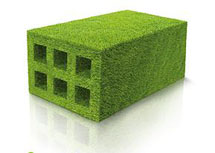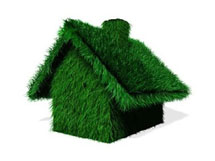

The sustainable building ensures environmental quality and energy efficiency of the building throughout its entire life cycle, from the design and construction phases to maintenance and demolition.
BUILT ENVIRONMENT HAS A DEEP IMPACT ON NATURAL ENVIRONMENT, ECONOMY, HEALTH AND PRODUCTIVITY.
BUILDINGS ARE RESPONSIBLE FOR:
- 36% of total energy use
- 65% of electricity consumption
- 30% of emissions of Greenhouse Gases
- 30% of raw materials use
- 30% of waste going to landfill
- 12% of drinking water consumption
WHY BUILD SUSTAINABLE?
THE FLOOR
The land is limited. Nowadays 80% of the Europeans live in an urban environment.
WATER
Agricultural irrigation consumes 71% of water resources compared to 18% in the domestic sector, 9% in industry and 2% in livestock.
ENERGY
40% of CO2 emissions are produced in urban environments. The building represents 42% of energy consumption in the EU.
MATERIALS
Building is an important consumer of materials and generator of residues.



